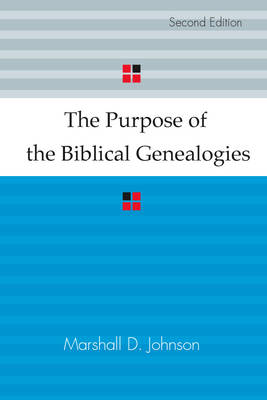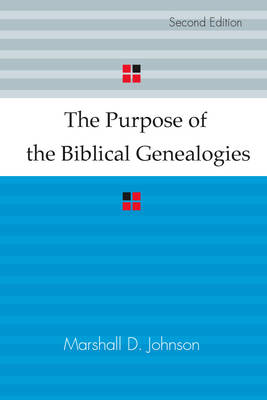
- Afhalen na 1 uur in een winkel met voorraad
- Gratis thuislevering in België vanaf € 30
- Ruim aanbod met 7 miljoen producten
- Afhalen na 1 uur in een winkel met voorraad
- Gratis thuislevering in België vanaf € 30
- Ruim aanbod met 7 miljoen producten
Zoeken
The Purpose of the Biblical Genealogies
With Special Reference to the Setting of the Genealogies of Jesus
Marshall D Johnson
Paperback | Engels
€ 58,45
+ 116 punten
Omschrijving
Genealogical material occurs frequently in the Old Testament, and in the Gospels of Matthew and Luke as well as in later Jewish literature. What is the purpose of these lists? How do they relate to their historical and literary context, and what is their function in the Hebraic-Christian literary tradition? Dr. Johnson answers these questions in relation to contemporary biblical scholarship, and is concerned to show that such genealogies are not merely appendices to biblical narratives but are closely related to their context in language, structure and theology He attempts to assess the extent to which they reflect the views of the authors of the books or contexts into which they are placed. He also examines the transition of the genealogical form, and shows how its function changed from tribal expressions to the Gospel writers' use of it to illustrate the conviction that Jesus is the fulfillment of the hope of Israel. Concerned as he is more with the literary purpose of this type of biblical literature than with the historical authenticity of various lists, Dr. Johnson examines a subject that is only now beginning to engage the attention of scholars generally.
Specificaties
Betrokkenen
- Auteur(s):
- Uitgeverij:
Inhoud
- Aantal bladzijden:
- 344
- Taal:
- Engels
Eigenschappen
- Productcode (EAN):
- 9781579102746
- Verschijningsdatum:
- 12/07/2002
- Uitvoering:
- Paperback
- Formaat:
- Trade paperback (VS)
- Afmetingen:
- 148 mm x 216 mm
- Gewicht:
- 444 g

Alleen bij Standaard Boekhandel
+ 116 punten op je klantenkaart van Standaard Boekhandel
Beoordelingen
We publiceren alleen reviews die voldoen aan de voorwaarden voor reviews. Bekijk onze voorwaarden voor reviews.







